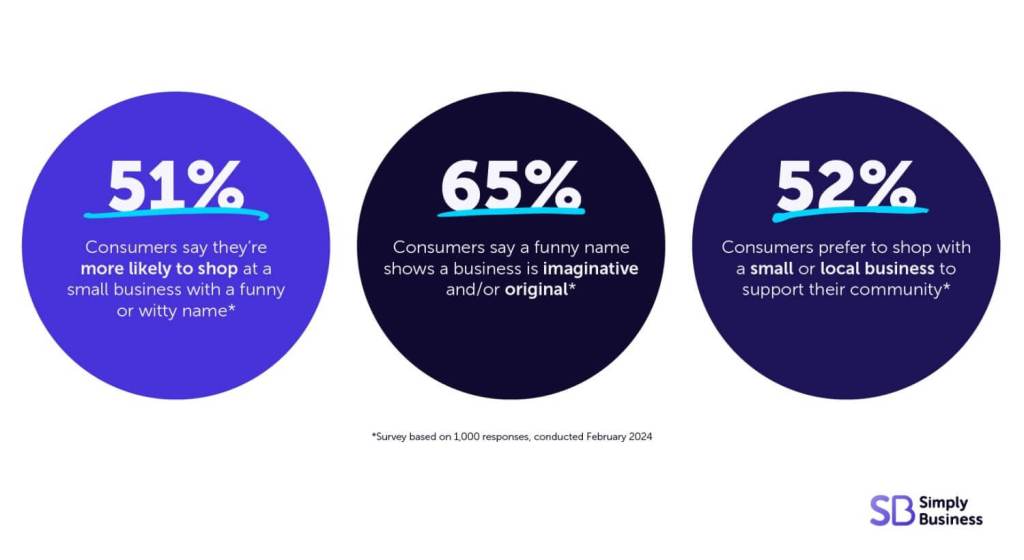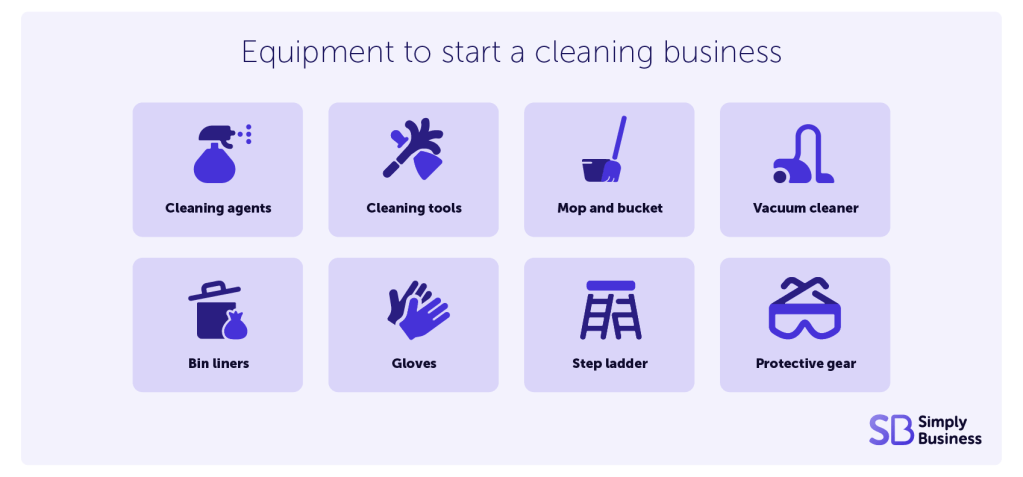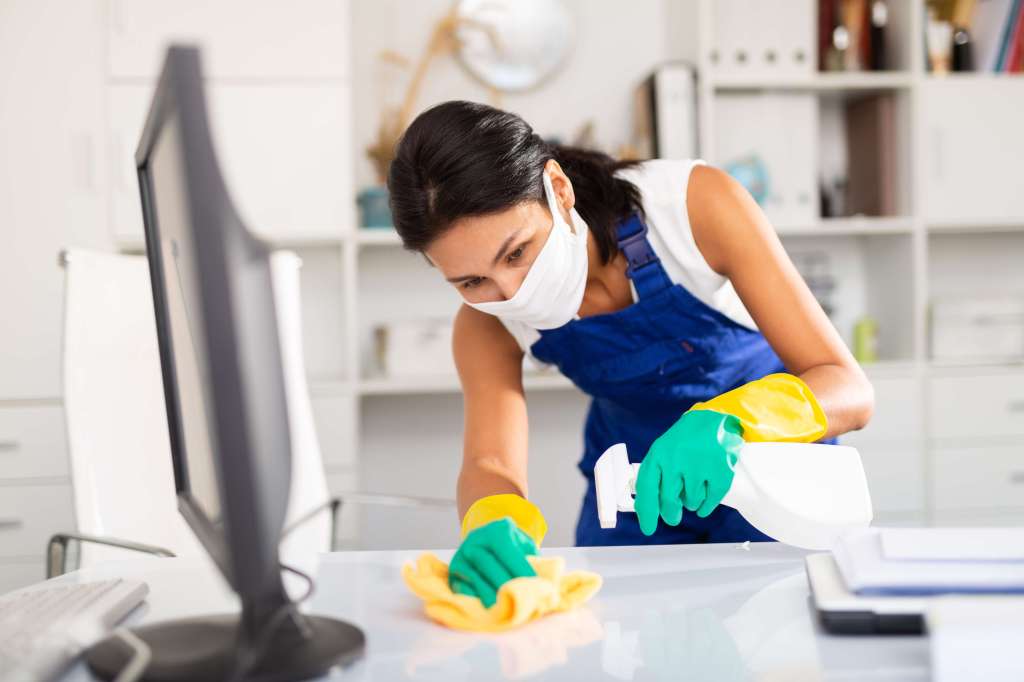Cleaning business quick start guide
If you’re looking to start your own cleaning business, make sure you complete these 10 steps:
- Identify your market: is there a gap you can fill or a niche you can target?
- Check qualifications: while not necessary, these can give you an edge in the market and set you apart from competitors
- Set a budget: consider what cleaning equipment you’ll buy and how much you’ll spend anything on marketing
- Choose your rates: complete competitor research to find the right price
- Write a business plan: this will help you stick to your goals and make strategic decisions – so don’t skip this step
- Choose your cleaning business name: make it memorable to appeal to customers
- Buy cleaning supplies: domestic cleaners will have less to buy than commercial cleaners
- Find your first clients: both online and offline marketing are good channels to explore
- Plan for growth: at what point will you be ready to take on additional staff?
- Get insured: this can help protect both you and your clients
Becoming a cleaner in the UK can be a great way to start working for yourself. From job security to a flexible working schedule, cleaners are able to earn an income in a role that fits around their existing commitments.
And with low startup costs and no necessary entry qualifications, you can start your own cleaning business relatively quickly.
Sound like the right career for you? Keep reading to find out how you can get started in our guide.
How to start a cleaning business in 10 simple steps
1. Identify your market
First, you need to decide what kind of cleaner you’re going to be, and what market you’re going to serve. There are three main cleaning markets: domestic, commercial, and specialist.
Your choice of market will likely depend on your experience, but you should also make sure that you do some research. A key question to ask is what are the relative sizes of those markets in your local area?
Read our guide to finding a gap in the market to help you identify any possible opportunities for your business.
2. Check qualifications
Domestic cleaners don’t generally require any qualifications. However, you may need a qualification and commercial cleaning equipment for specialist cleaning jobs.
For more information on cleaning courses, contact the British Institute of Cleaning Science.
3. Set a budget
If you’re planning on running a domestic cleaning service, you may only need to invest in a few essential items such as cleaning chemicals, mops, and microfibre cloths.
On the other hand, commercial and specialist cleaners will need to consider buying important items such as professional vacuum cleaners or carpet cleaners which can cost thousands of pounds. Think about what you’ll need and make sure you’ve got enough to cover the basics.
Check out our guide on how to set a business budget to help with this step.
4. Decide how much to charge
How much will you charge for your services? Will you charge by the hour or a flat fee? An hourly rate could be a good idea if you’re unsure of how long you’ll be cleaning for, while a flat fee is often preferred by clients as they’ll know exactly how much they need to pay you in advance. It’s also a good idea to research prices in your area first to get an idea of what the going rate is.
Our guide to setting a freelance rate can help you know how much to charge.
You can also consider setting up an online payment system so you can easily take payment from your clients.
You may also want to consider setting up a business bank account so you can keep your personal finances separate.
5. Write a business plan
You can simplify the process of starting a cleaning business by writing a business plan. This document helps you to build a sound foundation for your venture as you start and grow it. Within your plan you’ll conduct market research, build financial forecasts, and choose your marketing channels.
You can learn more about this in our step-by-step guide to writing a business plan.
6. Choose cleaning business names
One of the most important (and fun) parts of starting any business is choosing the right company name. Not only is this an important step if you’re setting up a limited company, it’s also a way to attract customers.
We have a whole guide that goes through how to come up with a memorable company name, plus how to register it.
But a good place to start is to remember that the UK loves a funny business name – take a look at what the data says:

7. Buy cleaning supplies

Now that you’ve finalised your budget and your business plan, you can start buying your cleaning equipment. While this will differ depending on the type of services you offer, here are some ideas of what to buy for a domestic cleaning business:
- cleaning agents – such as all-purpose cleaner, glass cleaner, disinfectant, floor cleaner, and wood cleaner
- sponges, cloths, and brushes – use a range of different tools depending on the surfaces you’re cleaning
- mops and buckets – you may have multiple mop heads for different floor types
- vacuum cleaner
- bin liners – check with your clients whether they’ll provide these
- gloves – either disposable or reusable
- step ladder – check whether your client has their own you can use
- protective gear – such as goggles or masks
- uniform – to keep your clothes clean or to advertise your business
8. Look for clients
Now it’s time to pitch. The ways you’ll attract clients will depend on the market you’ve chosen. For example, if you’re a domestic cleaner, it might be as simple as knocking on doors or posting flyers through letterboxes.
If you’re looking for inspiration, why not try advertising your services in a business directory?
However, you might also consider reaching more customers through digital marketing. Our ultimate guide to marketing should be able to give you some ideas.
9. Plan for growth
It might be that you want to stay small, particularly if you’re a one-man-band domestic cleaner. However, cleaning businesses have the potential to grow from single-person operations into small companies employing several people. As your business grows, you might look to take on additional cleaning staff to help you spread the workload.
If you do this, make sure you’re aware of national minimum wage legislation and your obligation to take out employers’ liability insurance, which we cover below.
10. Get insurance for your cleaning business
As a cleaner, your clients are trusting you to care for their property. That’s why finding insurance for your cleaning business can help to protect both you and your clients.
Consider taking out a public liability insurance policy to protect yourself against claims arising from injury or loss suffered by a member of the public as a result of your work.
And remember that if your cleaning business grows and you employ additional staff, it’s a legal requirement to get employers’ liability insurance.
Cleaning business legal obligations
As with any other self-employed profession, cleaning businesses have a few legal obligations, particularly with regard to tax.
You need to register as self-employed with HMRC, and you’ll need to complete an annual Self Assessment tax return. You’ll also need to pay your tax bill by 31 January each year, and make a payment on account every 31 July.
You can read more about how to do a Self Assessment tax return in our guide.
Top tips from a professional cleaner
Another way to become a cleaner is to get advice from someone with experience in the industry. To help, we reached out to Harriet Thomas, founder of Calm Oasis Cleaners, to give you some top tips for starting a cleaning business. Watch Harriet guide you through the process in this video, or read the tips below.
1. Be prepared for a challenge
Starting a business from scratch can be tough, but it can also be hugely rewarding. Think about ways to manage variations in your income and, as your business grows, get ready to take on the responsibility of managing staff. And above all, don’t get disheartened when the going is tough – as Harriet says, “stay true to your vision!”
2. Take advice
Talk to as many people as possible – by canvassing opinion you can help to make sure that you’re on the right track. And crucially, look into speaking to a range of financial advisors.
3. Get ready for unusual requests
Cleaning is an incredibly personal business, and your clients will each have their own needs. It’ll keep you on your toes.
4. Think about catering to landlords
By making yourself an end-of-tenancy pro, you can serve a large and growing market. Many landlords simply don’t have the time to conduct thorough cleans between tenants, so this can be a great niche for a cleaning business.
5. Don’t forget insurance
Your customers will want to be confident that you’re covered if something goes wrong while you’re working in their property. And don’t forget, if you’re employing people, you’re legally obliged to take out employers’ liability insurance.
Still deciding whether to start your own cleaning business?
If you’re still making your mind up, take a look at some of our other guides on setting up your own business.
- small business ideas – best businesses to start yourself
- gardening business
- cake and baking business
- self-employed hairdresser
- dog walking business
- personal trainer
More guides for small businesses
- Business Name Generator
- How to start a business
- Self-employed tax deductible expenses: what can I claim?
- Going self-employed in the UK: a guide
- How to do market research: an affordable guide for small businesses
- What type of business insurance do I need?
Photo: JackF/stock.adobe.com
